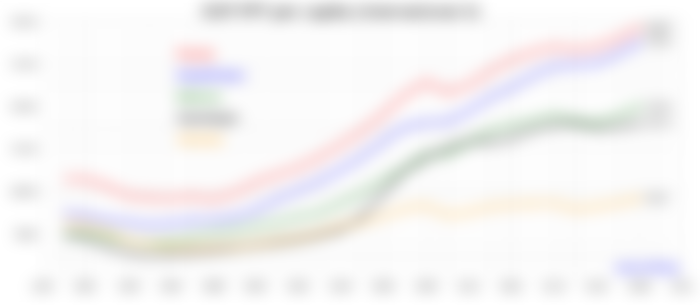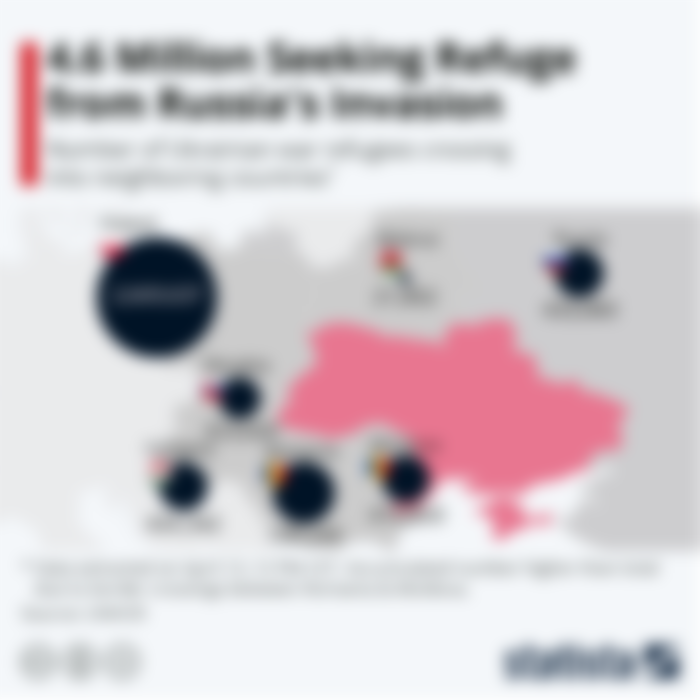How badly did Putin's invasion affect the Ukrainian economy?

Over the last few months, a lot of attention has been directed at Russia's economy. The media have spent countless hours tracking the ruble and discussing if and how the new sanctions will affect Putin's war chest. But this emphasis on Russia can obscure the fact that the economy most affected by this war will be Ukraine's and if estimates are anything to go by it will be pretty seriously affected. So in this article we'll be taking a look at the impact of the war on Ukraine's economy. How much worse it might get and how it might recover in the future.
Let's start by taking a look at Ukraine's economy pre-war as of 2020 Ukraine had a GDP of about 150 billion dollars which given its population of about 44 million people came to a GDP per capita of $3,700 according to World Bank data. The median household income in Ukraine was about 2,100 dollars, and unemployment was at about ten percent. For context, all of these numbers mean that Ukraine was basically one of if not the poorest country in Europe with one of the highest unemployment rates to match. In fact, the only metric that Ukraine does well on is debt to GDP, which stands at an impressive 48.9 percent, one of the lowest in Europe. Regardless though Ukraine's relative poverty is largely a consequence of the fact that since 2014 Ukraine's economy has been pretty up and down.

Ukraine's GDP per capita compared to other soviet states, imf
Ukraine suffered a serious recession after the revolution in 2014 and the economy never quite recovered to its 2013 high when GDP came in at about 180 billion dollars and GDP per capita was a bit over four thousand dollars. Add to that pre-war Ukraine ran a trade deficit averaging about eight billion dollars a year which meant that Ukraine imported more than it exported. When it comes to imports, Ukraine's main ones are energy including coal, oil and natural gas and industrial machinery, while its main exports are things like foods and metals. All in all, Ukraine's pre-war economy wasn't in great shape despite solid public finances, the country was relatively poor and struggling to reach its pre-revolution highs. And unfortunately for ordinary Ukrainians, Putin's invasion has only made things worse.
Before we get into the headline figures, let's just talk a bit about how wars actually impact national economies. Obviously it goes without saying that wars interrupt the day-to-day functioning of an economy it's hard to run a business when missiles are falling overhead, but they also affect a country's ability to borrow money on the international markets because well investors have to price in the possibility that at the end of the war the country they've lent money to won't exist anymore and beyond that wars just take a big toll on the public purse. A modern state has to pay its army as well as providing relief funding to citizens displaced or affected by the war, all of which they have to do with lower tax revenues. Anyway, what are the material impacts of the war on Ukraine's economy so far? Well according to analysis by the Kiev school of economics from early April has so far incurred some 100 billion dollars worth of damage to Ukrainian infrastructure. About 40 billion of this comes from damage to roads and other transport infrastructure, which has also obviously had knock-on impacts for the broader economy. Because it's made both inter and international trade more difficult.

Wheat exports by countries, dw
Simultaneously two of Ukraine's largest metallurgical enterprises have been destroyed which is pretty terrible news given the iron and steel were Ukraine's largest exports pre-war. The war has also made the Black Sea inaccessible which is where Ukraine exports and imports most of its stuff from, in fact most of Ukraine's southern coastline is currently occupied by Russian forces and the bits that aren't like Odessa have been mined by Ukrainian forces to deter Russian ships. Perhaps unsurprisingly then trade has pretty much collapsed with exports halving between February and march and imports falling by more than two-thirds, and this is particularly bad news for Ukrainian farmers who export most of their crop via the Black Sea. While the new planting season is going surprisingly well, apparently about 80 percent of the usual crop has still been planted, it's unclear what will actually happen when we get to next year's harvest. Given that the ports are still blocked, and most grain silos are already full.
As well as exporters, the war has also disrupted domestic Ukrainian businesses. According to Ukrainian government, about 30% of Ukrainian businesses have ceased all activities and 45 percent are working at reduced capacity. So it perhaps makes sense that some 4.8 million jobs have been lost since the war began, amounting to roughly 30 percent of all pre-war employment. And the international labor organization estimates that this figure could rise to 7 million if the war continues. Add to that, some 5 million Ukrainians have fled the country, while an estimated 7.7 million have been internally displaced. Together these three factor the collapse of trade, the pausing of local business activity and the refugee crisis mean that Ukraine's GDP outlook for this year isn't looking good. In March the IMF estimated a GDP contraction this year in the range of 25 to 35 percent and in April the World Bank estimated an even greater contraction of 45 percent, with the worst affected areas unsurprisingly being in the east of Ukraine.

Ukrainian refugee numbers by country, statistia
In fact, the Ukrainian central bank already reckons that Ukraine's GDP has shrunk by 50 percent since the war began, which means that the true figure could be even larger than those already terrifying estimates. So you get the idea the war is going to Ukraine's economy, but what about after the war? What of Ukraine's prospects for a recovery? Well as things stand things aren't looking good. Rebuilding Ukraine will involve more than just repairing the hundred billion dollars worth of damage done to infrastructure thus far, it will also involve investment into new technology a new military and even new political institutions. That's why the estimated cost of rebuilding Ukraine is so high. The center for economic policy research put the figure between 200 and 450 billion dollars, while the Ukrainian government has put it between 600 billion and a trillion dollars. Just to remind you, Ukraine's entire GDP for 2020 was 150 billion dollars, and it's expected to fall below 100 billion dollars this year.
Ukraine obviously can't borrow the money to make up the difference either, while the country had solid public finances going into the war with a total government debt of just 75 billion dollars and a debt-to-gdp burden that most European countries would envy the war has certainly strained the public purse. Despite cutting back on public spending the Ukrainian government is still spending five billion dollars more than it receives in taxes each month, this is both because spending costs have increased armies aren't cheap after all and because revenues have collapsed. Government revenues have fallen by nearly 50 percent since the war began, with customs revenues falling by 75 percent, and this would translate to an annual deficit of about 60 percent of their GDP. For context, the average European deficit in 2021 was about five percent and pre-war Ukraine was expected to run a three percent deficit.

Ukraine GDP by years (after 2020 there is no accurate number), statistia
Anyway, all of this spending has pushed Ukraine's borrowing costs sky-high and its one-year bond currently has an inferred yield of over 50 percent, and it's not really like the central bank can just print money either. Ukraine's currency has fallen 10 percent against the dollar and inflation is running at about 11 percent. Anyway, you get the idea Ukraine's economy is struggling and recovery certainly won't be easy. Ultimately this means that Ukraine will need help from its western allies long after the fighting has finished, and the big question is whether European and American electorates will be as keen on spending money to rebuild Ukraine as they have been sending them heavy weapons.




